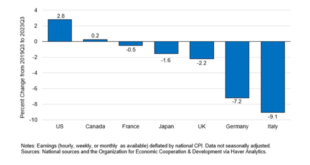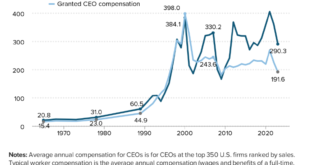In Europe (the Euro area, to be precise), both unemployment and inflation are down, according to Eurostat,. Which, again, shows that the Phillips curve, a crucial concept behind neoclassical macroeconomic thinking that assumes a more or less stable negative relation between unemployment and inflation (high unemployment will bring inflation down), is not the place to go when predicting or analysing inflation. Sometimes, this relation is specified as a relation between wage increases and...
Read More »The 2024 economic sciences laureates
from Lars Syll The Sveriges Riksbank Prize in Economic Sciences in Memory of Alfred Nobel 2024 is awarded to Daron Acemoglu, Simon Johnson and James Robinson “for studies of how institutions are formed and affect prosperity.” Daron Acemoglu and James Robinson’s work, particularly in Why Nations Fail (2012), is widely recognized within new institutional economics for its argument that inclusive political and economic institutions are key determinants of long-run prosperity and...
Read More »CEO-to-worker compensation ratio, 1965-2023
The European Central Bank and the return of history
The end of the post-World War II ´Pax Americana, an almost eighty-year period of peace for European countries allied with the USA, will soon lead the EU to end the prohibition of monetary financing of governments by the European Central Bank (ECB). This might take the shape of the ECB providing credit to an entity purchasing Eurobonds, which will further increases military spending. At this moment, there is based on the Maastricht treaty of 1992 a strict prohibition of monetary financing...
Read More »Automation is called “Productivity Growth”
from Dean Baker It is more than a bit bizarre reading pieces that talk about automation or job-killing AI as something new and alien. These are forms of productivity growth. They allow more goods and services to be produced for each hour of human labor. Productivity growth is usually thought of as a good thing. It’s the reason that we don’t have half the U.S. workforce employed in agriculture growing our food. Instead, it is around 1.0 percent of the U.S. workforce, and we grow enough to...
Read More »Brenner’s satisfactory
from Peter Radford “Mathematics is the art of the perfect. Physics is the art of the optimal. Biology, because of evolution, is the art of the satisfactory”. That’s Sydney Brenner speaking. He should know a thing or two. He won a Nobel Prize. It’s a shame, is it not? Economies are always changing. Not just in terms of innovation and all the normal things we think of as change, but also in more simple terms: in the people making up an economy change. They are born and they die. And...
Read More »“15 Best Economics Book Blogs and Websites in 2024”
from Feedspot The best Economics Book blogs from thousands of Book blogs on the web and ranked by traffic, social media followers & freshness. Economics Book Blogs Here are 15 Best Economics Book Blogs you should follow in 2024 1. Real-World Economics Review Blog The Real-World Economics Review blog serves as a critical platform for economists, scholars, and thinkers who challenge mainstream economic theories and advocate for more realistic, socially relevant approaches. It brings...
Read More »The Road Not Taken
from Lars Syll We all heterodox economists who have chosen the road ‘less traveled by’ know that this choice comes at a price. Fewer opportunities to secure ample research funding or positions at prestigious institutes or universities. Nevertheless, yours truly believes that very few of us regret our choices. One doesn’t bargain with one’s conscience. No amount of money or prestige in the world can replace the feeling of looking in the mirror and liking what one sees. My friend Axel...
Read More »Automation is called “productivity growth”
from Dean Baker It is more than a bit bizarre reading pieces that talk about automation or job-killing AI as something new and alien. These are forms of productivity growth. They allow more goods and services to be produced for each hour of human labor. Productivity growth is usually thought of as a good thing. It’s the reason that we don’t have half the U.S. workforce employed in agriculture growing our food. Instead, it is around 1.0 percent of the U.S. workforce, and we grow enough to...
Read More »Escaping the jungle: Rethinking land ownership for a sustainable Future
from Asad Zaman and WEA Pedagogy Blog Introduction: Beyond the Jungle For centuries, capitalism has told us that land is a commodity to be bought, sold, and exploited for profit. It has also sold us a dangerous myth: that humans are inherently competitive, isolated individuals, destined to fight for survival in a brutal world. According to this worldview, land belongs to those who claim it first and use it for personal gain. But this idea is not only destructive—it’s profoundly false....
Read More » Real-World Economics Review
Real-World Economics Review





